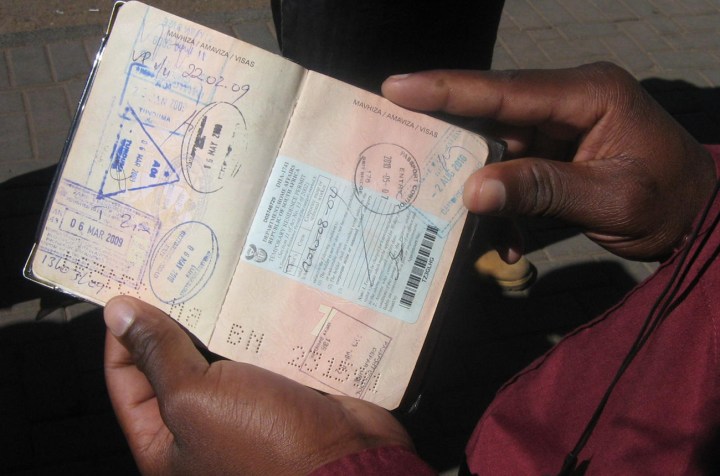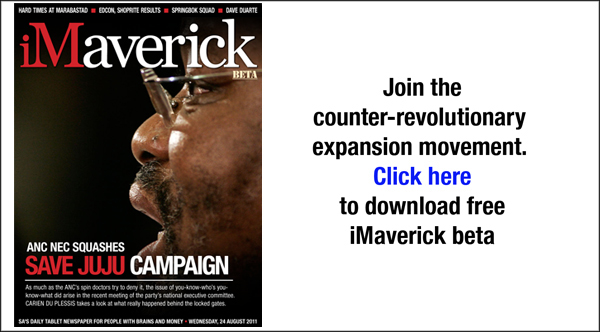Politics
Hard times – the story of Zimbabweans trying to get legal at Marabastad

If you are a Zimbabwean who wants to get your papers in order at the Marabastad Refugee Centre in Pretoria run by Home Affairs it could cost you R100 to get through the gates. With Zimbabweans stampeding to get their papers in order, desperation provides vultures with easy pickings. By MANDY DE WAAL.
Jealous Mavudzi has stood in this queue more times than he’d like to remember. Behind him, a barren piece of land where those who squat overnight burn tyres and other bits of rubbish to try to keep warm during cold nights that bite to the bone. Ahead of him, the Home Affairs building that is Marabastad Refugee Centre, a stone’s throw away from Pretoria’s city centre. The building is well guarded by a handful of security people who decide who goes in, and who doesn’t.
Mavudzi and numerous other Zimbabwean nationals desperate to get their paper work in order say it costs them R100 to get through the gates. “My brother was here last week and they wanted money before letting people in,” says Mavudzi. “You can see that people sleep here in this field across the road but to get through you must pay. It doesn’t matter if you are the first, if you don’t pay you will be the last to get in. If you get in.” Mavudzi and others interviewed outside the refugee centre say R100 must be paid to the security guards, or to hawkers in the open lot who collect the funds for the security staff.
“It is very terrible,” says Mavudzi. “If you don’t have money you won’t get the documents. All these people here are suffering the same. You sleep in your clothes. You burn tyres and plastic to get a bit warmer. You have to pay to go to the toilet. It costs R2 to use the toilet around the corner.”
When asked why Mavudzi and the eight or other Zimbabwean nationals haven’t complained or taken action, Mavudzi shakes his head. “Where do they complain? As you can see, there is no one here. I feel so angry. All they want is to renew their asylum and you are fined R1,000 a day or up to R3,000 if your papers are not in order. If you don’t pay because there is no money ,you know what comes after. You have to find the money or else you are deported. You go back to Zimbabwe where there is nothing.”
As this journalist speaks to Mavudzi, a woman cuts in through the crowd that the interview has attracted outside Marabastad’s Refugee Centre. She’s South African, is married to a Zimbabwean and asks not to be named. “I paid the money. I don’t care,” says the 44 year old woman. “When you come here, the security people hit us with sjamboks to make sure we don’t pass without paying. We are so afraid to talk. I paid to one of them. This is how the system works. You must pay to the people to get in. If people try to go in without paying, you get the sjambok. These people that are hitting us are the private security guards who don’t wear labels. They are the ones who take the money.”
In September 2010, the South African government announced an end to a special dispensation that had enabled Zimbabweans to enter and stay in South Africa without legal documents. Since then, the clock has been ticking for Zimbabweans without the proper documentation.
To manage the process, Home Affairs created the “Zimbabwe Documentation Project” which declared a cut-off date for processing Zimbabwean nationals without legal documentation. Home Affairs insisted that it would not embark on a mass deportation campaign, but a release on the process at the beginning of this August this year ended with an ominous warning: “Those who have failed to take advantage of this process will indeed in due course, face the full consequence of South Africa’s immigration laws once the process is finalised”.
Newspapers picked up on the threat and ran with stories that read: “Illegal immigrants now face the full wrath of the law”; “Thousands of Zimbabweans in South Africa Face Deportation”; and “Comply with SA laws or else”.
With a July deadline imposed on the documentation process, Zimbabweans rushed en mass to the Marabastad Refugee Centre as rumours abounded that illegals would be deported as part of a wide scale operation.
At the beginning of July, a stampede at Marabastad’s refugee centre injured 14 people. A second stampede later in July had media speculating that two people had died during the crush, one of them a young girl. Home Affairs later denied that anyone had been killed in the second stampede.
“Did you hear about the baby that died here,” the 44 year old South African woman who is helping her Zimbabwean husband process his documents asks. “I phoned the Daily Sun to come and help but they didn’t arrive. I paid my money so I can get my husband’s papers because you can spend weeks here. I didn’t want to wait so I paid.”
Mavudzi says that he’s scared about speaking to the media, but wants something to be done about the situation. “I am scared that there will be a go slow here if we talk to the press. We are scared that things will be worse, that they won’t be better.” As Mavudzi speaks the crowd that has gathered around him starts interjecting. They say that Home Affairs officials are often rude and xenophobic. “The people inside ask us Zimbabweans what we want in this country. They say we can rather go back home,” a man in the crowd says.
“You have to be patient and take it,” Mavudzi says. “You are the one who needs help. You must take it.” Mavudzi adds that Zimbabweans are the vulnerable ones with no choices. They must endure the process in order to become legal.
In response, the Department of Home Affairs says that it is government policy that people should be free to enter government buildings at no cost. Ronnie Mamoepa who heads up media relations says everyone at Home Affairs knows as a matter of fact that no one is supposed to pay for entry to Home Affairs government services.
Speaking to Daily Maverick, Home Affairs Deputy Director-General Jackie McKay says the story about bribes at Marabastad is known to the department, and not news to the department. “You need to tell us who took the bribes and we will be sure to act against them. We have heard this story many times but haven’t received any names of the security people. If we know the names we will definitely do something about this,” says McKay. “We have been asking for these complaints for some time. We have a counter corruption team in plain clothes at Marabastad looking into the matter.”
McKay urges people who encounter fraud at the Marabastad refugee centre to phone the Home Affairs anti-corruption hotline on 0800 701 701. This goes through to national anti-corruption hotline for public services. The hotline is answered by a voice recording, and there are a number of options to go through before getting to an agent. This number is visible on Home Affairs’ website, but the department would better serve distressed Zimbabweans by putting it on a big sign outside the entrance to the Marabastad Refugee Centre.
When Daily Maverick phones the hotline a man called Phusa answers and says any report to the line is dispatched for investigation by the police in 24 hours. He adds that investigations are completed in six to eight weeks and that complainants get a unique number to track the outcome of investigations. Complainants can remain anonymous if they so wish. Daily Maverick lodges a complaint on behalf of the Zimbabweans interviewed.
The Zimbabweans Daily Maverick spoke to at Marabastad paint a bleak picture of life for those who aren’t legal. The option of going back to Zimbabwe, they say, is infinitely more terrible, despite the hardship they often face in South Africa.
A 27-year-old man who does not want to be identified says it’s hard trying to survive in Zimbabwe. “You don’t have a chance unless you are a dealer. You can’t get a job. I am a truck driver but the only job I got wasn’t paying. I would drive for free. You need to be a dealer, to buy and sell to live.”
The Zimbabweans at Marabastad say government officials earned about US$120 until a couple of months ago. “This is less than R1,000. Now civil servants earn about US$300 but that is not a lot of money and it is difficult to get a job in government.”
Travelling across the border many of these refugees from poverty say they stay with family and try to get jobs, but are often stumped because they don’t have papers. “You must have a permit to get a job here,” says the 27-year-old man.
Others in the queue at the refugee centre tell of their painful experiences of xenophobia. “It is apartheid. They are scratching us because they don’t take us like them. They threaten you,” says a youth who has come to SA in search of work. “They take us like we are from somewhere, like we are not human beings. It is like we are animals. It makes me angry. It makes me want to fight. Tell them they must treat us like brothers, not like animals.”
The sentence is no sooner out this man’s mouth when a Zimbabwean tries to sell a South African man a plastic sleeve for his documents. This results in shouting and the two of them scuffling. I ask what’s happening. “The South African is threatening him. He is saying we must go back to Zimbabwe.”
As the Daily Maverick leaves, the trader runs after to plead his case. “Tell them about this xenophobia. It is prevailing in their minds. They say to me I am from Mugabe and I must go back to him. I am very angry. The names they call us. It is a hate speech. They mustn’t say these words. I am an African. We are all Africans.” DM
Read more:
- Zim documentation project: It’s a wrap, says home affairs in Mail & Guardian;
- Thousands of Zimbabweans in South Africa Face Deportation at Voice of America;
- Foreign ID fraud ‘bleeding SA fiscus’ in Business Report.
Photo: Daily Maverick.




 Become an Insider
Become an Insider